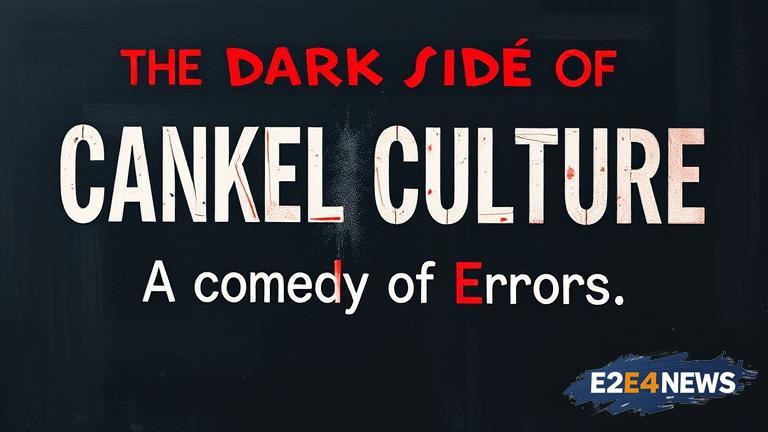Cancel culture has been a topic of discussion in recent years, with many people being ‘canceled’ for their actions or statements. However, the question remains as to whether this culture is really effective in bringing about change. On one hand, cancel culture can be seen as a way to hold people accountable for their actions and to bring attention to important issues. On the other hand, it can also be seen as a form of mob mentality, where people are quick to judge and condemn without fully understanding the situation. The comedy of cancel culture lies in the fact that it often targets the wrong people, or targets people for the wrong reasons. For example, a person may be canceled for a statement they made years ago, without considering the context or their growth since then. Additionally, cancel culture can also be used as a tool for bullying and harassment, where people are targeted and attacked for their opinions or beliefs. The impact of cancel culture can be severe, with people losing their jobs, reputations, and even facing physical harm. Furthermore, cancel culture can also stifle free speech and creativity, as people become afraid to express themselves or share their ideas. The phenomenon of cancel culture is not limited to any one country or region, but is a global issue that affects people from all walks of life. In Australia, for example, cancel culture has been used to target politicians, celebrities, and even ordinary citizens. The Australian government has even gotten involved, with some politicians calling for greater regulation of social media to prevent the spread of cancel culture. However, others argue that this would be a form of censorship, and that people have the right to express themselves freely. The debate around cancel culture is complex and multifaceted, with different people having different opinions on the matter. Some argue that cancel culture is necessary to bring about change and to hold people accountable, while others see it as a form of mob mentality that stifles free speech and creativity. Ultimately, the comedy of cancel culture lies in its unpredictability and its ability to target anyone, regardless of their intentions or actions. As the phenomenon continues to evolve, it will be interesting to see how it plays out and what impact it will have on society. The consequences of cancel culture are far-reaching and can have a significant impact on people’s lives. It is therefore important to approach the topic with nuance and understanding, rather than simply jumping on the bandwagon. By doing so, we can work towards creating a more just and equitable society, where people are held accountable for their actions, but also given the opportunity to grow and learn from their mistakes. The future of cancel culture is uncertain, but one thing is clear: it will continue to be a topic of discussion and debate for years to come. As we move forward, it is essential to consider the potential consequences of our actions and to approach the topic with empathy and understanding. Only by doing so can we create a more compassionate and just society, where people are able to express themselves freely and without fear of retribution. In conclusion, the comedy of cancel culture is a complex and multifaceted phenomenon that requires careful consideration and nuance. While it can be an effective tool for bringing about change, it can also be used as a form of bullying and harassment. As we navigate this complex issue, it is essential to approach it with empathy and understanding, and to consider the potential consequences of our actions.
